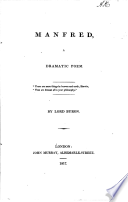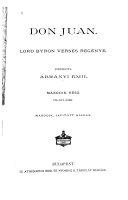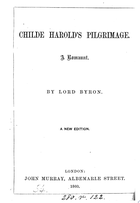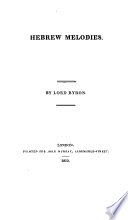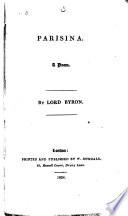“The heart will break, but broken live on.”
Variant: And thus the heart will break, yet brokenly live on.
George Gordon Byron, 6th Baron Byron, FRS , commonly known as Lord Byron, was an English poet, peer, politician, and a leading figure in the Romantic movement. He is regarded as one of the greatest British poets and remains widely read and influential. Among his best-known works are the lengthy narrative poems, Don Juan and Childe Harold's Pilgrimage, and the short lyric poem, "She Walks in Beauty".
He travelled extensively across Europe, especially in Italy, where he lived for seven years in Venice, Ravenna and Pisa, where he had a chance to frequent his friend the poet Percy Bysshe Shelley. Later in his brief life, Byron joined the Greek War of Independence fighting the Ottoman Empire, for which Greeks revere him as a national hero. He died in 1824 at the age of 36, from a fever contracted while in Missolonghi.
Often described as the most flamboyant and notorious of the major Romantics, Byron was both celebrated and castigated in life for his aristocratic excesses, including huge debts, numerous love affairs – with men as well as women, as well as rumours of a scandalous liaison with his half-sister – and self-imposed exile. His only legitimate child, Ada Lovelace, is regarded by some as the first computer programmer based on her notes for Charles Babbage's Analytical Engine. His illegitimate children include Allegra Byron, who died in childhood, and possibly, Elizabeth Medora Leigh.

“The heart will break, but broken live on.”
Variant: And thus the heart will break, yet brokenly live on.
“Friendship is Love without wings.”
L'Amitié est l'Amour sans Ailes, reported in Bartlett's Familiar Quotations, 10th ed. (1919).
“Friendship may, and often does, grow into love, but love never subsides into friendship.”
Quoted by Marguerite Gardiner, Countess of Blessington in Conversations of Lord Byron with the Countess of Blessington http://books.google.com/books?id=w648AAAAYAAJ&q="Friendship+may+and+often+does+grow+into+love+but+love+never+subsides+into+friendship"&pg=PA179#v=onepage (1834).
Canto I, Stanza 6; this can be compared to: "The bloom of young Desire and purple light of Love", Thomas Gray, The Progress of Poesy I. 3, line 16; also: "Oh, could you view the melody / Of every grace / And music of her face", Richard Lovelace, Orpheus to Beasts; "There is music in the beauty, and the silent note which Cupid strikes, far sweeter than the sound of an instrument", Thomas Browne, Religio Medici, Part ii, Section ix.
The Bride of Abydos (1813)
“In secret we met
In silence I grieve,
That thy heart could forget,
Thy spirit deceive.”
When We Two Parted (1808), st. 4.
Context: In secret we met
In silence I grieve,
That thy heart could forget,
Thy spirit deceive.
If I should meet thee
After long years,
How should I greet thee?
With silence and tears.
“Better to sink beneath the shock
Than moulder piecemeal on the rock.”
Source: The Giaour (1813), Line 969.
“I awoke one morning and found myself famous.”
Memorandum reference to the instantaneous success of Childe Harold and quoted in Letters and Journals of Lord Byron by Thomas Moore (1830), chapter 14.
She Walks in Beauty http://readytogoebooks.com/LB-SWB42.htm, st. 1. The subject of these lines was Mrs. R. Wilmot.—Berry Memoirs, vol. iii. p. 7.
Hebrew Melodies (1815)
“What was thy pity's recompense?
A silent suffering, and intense”
I.
Prometheus (1816)
Context: Titan! to whom immortal eyes
The sufferings of mortality
Seen in their sad reality,
Were not as things that gods despise;
What was thy pity's recompense?
A silent suffering, and intense;
The rock, the vulture, and the chain,
All that the proud can feel of pain,
The agony they do not show,
The suffocating sense of woe,
Which speaks but in its loneliness,
And then is jealous lest the sky
Should have a listener, nor will sigh
Until its voice is echoless.
“O'er the glad waters of the dark blue sea,
Our thoughts as boundless, and our souls as free”
Canto I, stanza 1.
The Corsair (1814)
Context: O'er the glad waters of the dark blue sea,
Our thoughts as boundless, and our souls as free,
Far as the breeze can bear, the billows foam, 22
Survey our empire, and behold our home!
These are our realms, no limit to their sway,—
Our flag the sceptre all who meet obey.
Churchill's Grave http://mykeep.com/lordbyron/churchillsgrave.html, l. 43.
“The wretched gift eternity
Was thine — and thou hast borne it well.”
II.
Prometheus (1816)
Context: Titan! to thee the strife was given
Between the suffering and the will,
Which torture where they cannot kill;
And the inexorable Heaven,
And the deaf tyranny of Fate,
The ruling principle of Hate,
Which for its pleasure doth create
The things it may annihilate,
Refused thee even the boon to die:
The wretched gift eternity
Was thine — and thou hast borne it well.
All that the Thunderer wrung from thee
Was but the menace which flung back
On him the torments of thy rack;
The fate thou didst so well foresee,
But would not to appease him tell;
And in thy Silence was his Sentence,
And in his Soul a vain repentance,
And evil dread so ill dissembled,
That in his hand the lightnings trembled.
“Thy Godlike crime was to be kind”
III.
Prometheus (1816)
Context: Thy Godlike crime was to be kind,
To render with thy precepts less
The sum of human wretchedness,
And strengthen Man with his own mind;
But baffled as thou wert from high,
Still in thy patient energy,
In the endurance, and repulse
Of thine impenetrable Spirit,
Which Earth and Heaven could not convulse,
A mighty lesson we inherit:
Thou art a symbol and a sign
To Mortals of their fate and force;
Like thee, Man is in part divine,
A troubled stream from a pure source;
And Man in portions can foresee
His own funereal destiny;
His wretchedness, and his resistance,
And his sad unallied existence:
To which his Spirit may oppose
Itself — and equal to all woes,
And a firm will, and a deep sense,
Which even in torture can decry
Its own concenter'd recompense,
Triumphant where it dares defy,
And making Death a Victory.
“Mont Blanc is the Monarch of mountains;
They crowned him long ago”
Act I, scene i.
Manfred (1817)
Context: Mont Blanc is the Monarch of mountains;
They crowned him long ago,
On a throne of rocks — in a robe of clouds –
With a Diadem of Snow.
“Triumphant where it dares defy,
And making Death a Victory.”
III.
Prometheus (1816)
Context: Thy Godlike crime was to be kind,
To render with thy precepts less
The sum of human wretchedness,
And strengthen Man with his own mind;
But baffled as thou wert from high,
Still in thy patient energy,
In the endurance, and repulse
Of thine impenetrable Spirit,
Which Earth and Heaven could not convulse,
A mighty lesson we inherit:
Thou art a symbol and a sign
To Mortals of their fate and force;
Like thee, Man is in part divine,
A troubled stream from a pure source;
And Man in portions can foresee
His own funereal destiny;
His wretchedness, and his resistance,
And his sad unallied existence:
To which his Spirit may oppose
Itself — and equal to all woes,
And a firm will, and a deep sense,
Which even in torture can decry
Its own concenter'd recompense,
Triumphant where it dares defy,
And making Death a Victory.
“While Washington's a watchword, such as ne'er
Shall sink while there's an echo left to air.”
St. 5.
The Age of Bronze (1823)
Context: While Franklin's quiet memory climbs to heaven,
Calming the lightning which he thence hath riven,
Or drawing from the no less kindled earth
Freedom and peace to that which boasts his birth;
While Washington's a watchword, such as ne'er
Shall sink while there's an echo left to air.
“Where is he, the champion and the child
Of all that's great or little, wise or wild”
St. 3.
The Age of Bronze (1823)
Context: Where is he, the champion and the child
Of all that's great or little, wise or wild;
Whose game was empires, and whose stakes were thrones;
Whose table earth — whose dice were human bones?
“When age chills the blood, when our pleasures are past—”
The First Kiss of Love http://readytogoebooks.com/LB-FKL44.html, st. 7 (1806).
Context: When age chills the blood, when our pleasures are past—
For years fleet away with the wings of the dove—
The dearest remembrance will still be the last,
Our sweetest memorial the first kiss of love.
“I know not what I could have been, but feel
I am not what I should be — let it end.”
Act IV, scene 1.
Sardanapalus (1821)
Context: I am the very slave of circumstance
And impulse — borne away with every breath!
Misplaced upon the throne — misplaced in life.
I know not what I could have been, but feel
I am not what I should be — let it end.
III.
Prometheus (1816)
Context: Thy Godlike crime was to be kind,
To render with thy precepts less
The sum of human wretchedness,
And strengthen Man with his own mind;
But baffled as thou wert from high,
Still in thy patient energy,
In the endurance, and repulse
Of thine impenetrable Spirit,
Which Earth and Heaven could not convulse,
A mighty lesson we inherit:
Thou art a symbol and a sign
To Mortals of their fate and force;
Like thee, Man is in part divine,
A troubled stream from a pure source;
And Man in portions can foresee
His own funereal destiny;
His wretchedness, and his resistance,
And his sad unallied existence:
To which his Spirit may oppose
Itself — and equal to all woes,
And a firm will, and a deep sense,
Which even in torture can decry
Its own concenter'd recompense,
Triumphant where it dares defy,
And making Death a Victory.
Act IV, scene 1.
Sardanapalus (1821)
Context: But take this with thee: if I was not form'd
To prize a love like thine, a mind like thine,
Nor dote even on thy beauty — as I've doted
On lesser charms, for no cause save that such
Devotion was a duty, and I hated
All that look'd like a chain for me or others
(This even rebellion must avouch); yet hear
These words, perhaps among my last — that none
E'er valued more thy virtues, though he knew not
To profit by them…
II.
Prometheus (1816)
Context: Titan! to thee the strife was given
Between the suffering and the will,
Which torture where they cannot kill;
And the inexorable Heaven,
And the deaf tyranny of Fate,
The ruling principle of Hate,
Which for its pleasure doth create
The things it may annihilate,
Refused thee even the boon to die:
The wretched gift eternity
Was thine — and thou hast borne it well.
All that the Thunderer wrung from thee
Was but the menace which flung back
On him the torments of thy rack;
The fate thou didst so well foresee,
But would not to appease him tell;
And in thy Silence was his Sentence,
And in his Soul a vain repentance,
And evil dread so ill dissembled,
That in his hand the lightnings trembled.
Inscription on the monument of a Newfoundland dog http://readytogoebooks.com/LB-dog63.htm (1808).
Context: Near this spot
Are deposited the Remains of one
Who possessed Beauty without Vanity,
Strength without Insolence,
Courage without Ferocity,
And all the virtues of Man, without his Vices.
This Praise, which would be unmeaning Flattery
If inscribed over human ashes,
Is but a just tribute to the Memory of
BOATSWAIN, a DOG
“But nothing rests, save carcases and wrecks,
Rocks, and the salt-surf weeds of bitterness.”
Act II, scene i.
Manfred (1817)
Context: Think'st thou existence doth depend on time?
It doth; but actions are our epochs: mine
Have made my days and nights imperishable
Endless, and all alike, as sands on the shore
Innumerable atoms; and one desert
Barren and cold, on which the wild waves break,
But nothing rests, save carcases and wrecks,
Rocks, and the salt-surf weeds of bitterness.
Letter to Thomas Moore (9 April 1814).
Context: My great comfort is, that the temporary celebrity I have wrung from the world has been in the very teeth of all opinions and prejudices. I have flattered no ruling powers; I have never concealed a single thought that tempted me.
Act I, scene i.
Manfred (1817)
“Then stirs the feeling infinite, so felt
In solitude, where we arealone.”
Source: Childe Harold's Pilgrimage
“Tis strange - but true; for Truth is always strange,
Stranger than Fiction”
Variant: For truth is always strange; stranger than fiction.
Canto II, stanza 20.
The Bride of Abydos (1813)
“They never fail who die
In a great cause.”
Marino Faliero, Act II, Scene 2, reported in Bartlett's Familiar Quotations, 10th ed. (1919).
“A woman being never at a loss… the devil always sticks by them.”
Source: Lord Byron: Selected Letters and Journals,
“I had a dream, which was not all a dream.”
Darkness http://readytogoebooks.com/Lb-Drk85.htm, line 1 (1816).
“On with the dance! let joy be unconfin'd”
Source: Childe Harold's Pilgrimage
Journal for Saturday, 27th November 1813; Quoted in Letters and Journals of Lord Byron by Thomas Moore (1830), Vol III, Chap. XVII, p. 208 http://books.google.com/books?id=nloLAAAAIAAJ&pg=PA208
